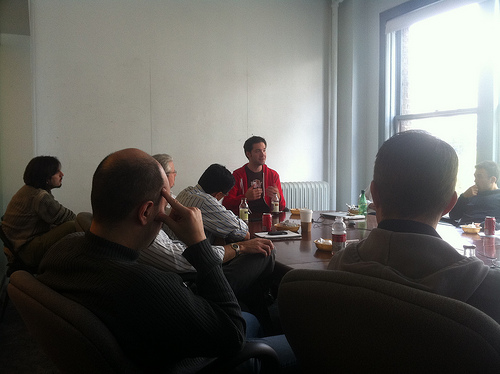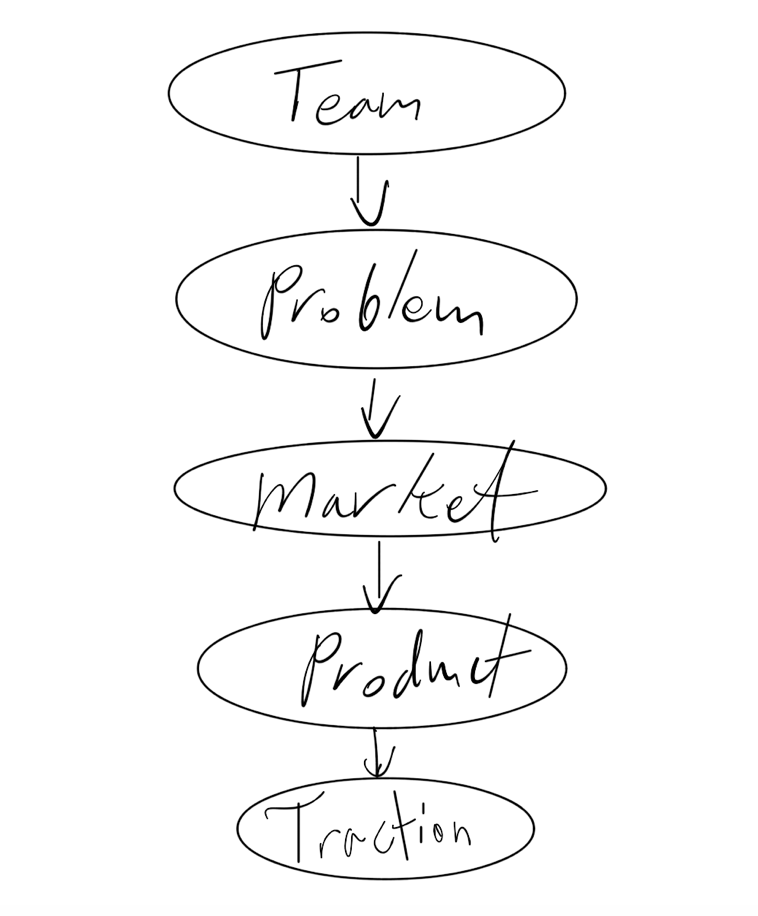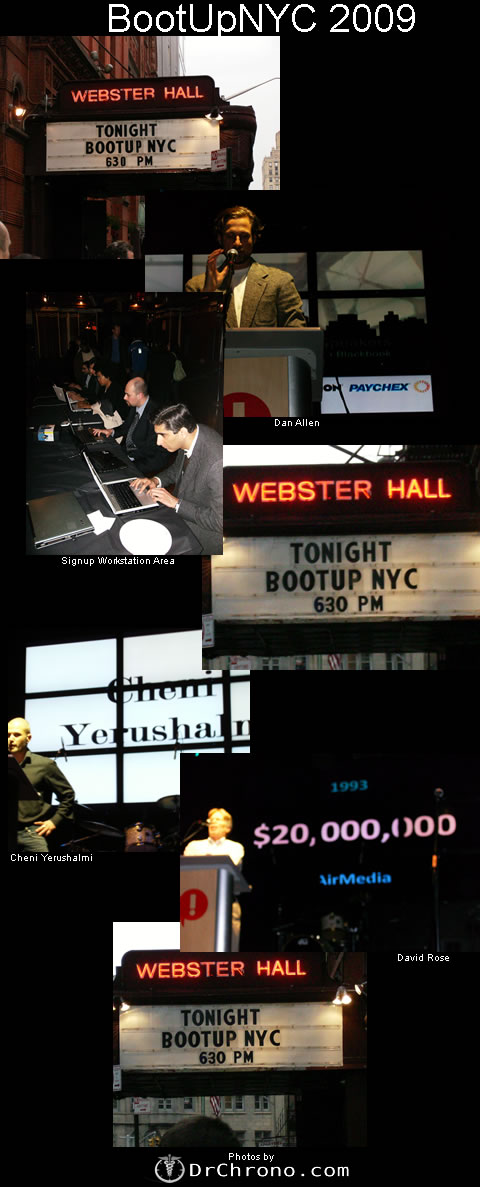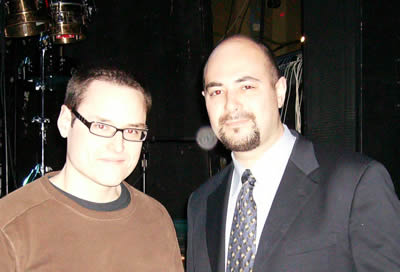
Daniel Kivatinos, COO and Cofounder of DrChrono
It’s what you practice in private that you will be rewarded for in public.
Time is short and running a company takes an enormous amount of focus, having a family and maintaining friendships is an important part of being a whole person. Shawn Stevenson talks about relationships correlating directly to your health, if you have good relationships, your health dramatically improves. In life one of the most important things is our health, be sure to make it a priority.
I hear people saying the words “work-life balance,” are important, I once heard someone talk about “work-life integration”, which is a better way to think about work and life. Why? If you can integrate your working life and home life, you can maintain the pressures of work and the needs of family and friends for a longer period. Life isn’t a quick race, startups aren’t a quick race, startups take time, so thinking about building a startup is like planning to run across the country, what is the easiest, smartest route you can take without falling apart along the way.
Below are some insights, ideas, and thoughts on how to have more life in balance.
TRAVEL HACKS
According to the U.S. Census Bureau, the nationwide average spent driving one-way commute to work is about 25.5 minutes, with Americans spending more than 100 hours a year commuting. Think about leveraging that time always for something productive, I always capitalize on that time. If I’m driving, I ask myself what can I do to be making an impact today? Or is there something I should be learning, or someone who I can call on this trip. The car and commute time is a great time to capitalize on a phone call or learning, listening to an audiobook.
SOCIAL
Having a support system and social life outside of work is important, whether it be a sports team, a board game meetup, a Pokemon Go group, be sure to find a group of people you can connect with. For my family, we are part of the local YMCA, they provide members “instant social events,” where I can take my son and have a great time. My son joined the local basketball team, it helped us both get out and about without the need to plan events, they provide great resources. I highly recommend checking out the Y.
Networking
I spend about two-thirds of my time on my business and about one-third of the time networking. If I didn’t network a part of my time, DrChrono would have never have gotten in Y Combinator, we wouldn’t have found our enterprise sales leader at Stanford or found our first designer Hong. I focus on my strengths and find others who can fill my gaps.
Choose your peer group really well. The number one way to improve or play at a high level is to populate your working life with high performers.
I connect with people at least once a week that help me grow personally or professionally.
I have several people that I consider my “accountability partners’ who keep me on track and push me in areas of business and personal life that really keep me accountable.
WALKING
Always have walking meetings, at DrChrono part of our company culture and to have good team communication, we tend to go on a lot of walks. Strategy walks are always productive giving, getting updates and learning from my team.
In the early days even before we incorporated back in 2008, Michael and I would go on lengthy walks to talk about action items we needed to take to build a company in healthcare. We both knew creating a lasting company in the healthcare space would be a long-term endeavor.
Communicating rapidly every step of the way would be critical. We would stroll to local coffee shops in New York City, talk along the way, grab a coffee, talk some more and walk around the city. Walking also paid off in finding some critical team members. A great example: We hired Hong our design leader simply by going on walks with him. Hong and I knew each other as friends. I would tell Hong a bit about what Michael and I were working on and he would give me input on design, we did this a bit and those walks led to him joining us early on.
Walking made us more productive. We would go for a walk, get our legs moving, blood would be flowing and get our minds in a good headspace where we would think clearly about the company. We have been doing this since the beginning of the company.
The same goes for phone calls, one of the best ways to stay in shape, be mentally healthy is to simply get up and walk around. Get a standing desk as well as your draft and send out emails. The human body wasn’t designed to sit for long periods of time, humans were designed to hunt way back when.
WORKING OUT & SLEEP
If you don’t make time for health now you will be forced into illness later, the most important thing in life is to have enough energy to tackle the problems of a day, if I don’t have enough energy I won’t perform well. I educate myself on what keeps me healthy on a weekly basis, learning from books and podcasts. For example, does water help in the mornings? Nothing tastes as good as feeling healthy.
Some tools for health that I use:
TRX Tactical is great for travel – One great way to stay in shape is TRX it’s mobile keeps you healthy and you could bring it anywhere traveling at work anywhere.
Resistance Bands are also great for travel – Another great way to stay in shape is resistance bands there actually really mobile you can throw them in your backpack.
Small Home Gym – One secret to staying healthy long term is to make a small investment in a small home gym. You don’t need anything big but a few items to really allow me to get a quick workout in on the days I simply don’t have time to go to the gym. You can buy a small weight set and kettlebells at Costo or Target for home.
Health Apps I recommend and use:
- Headspace and Insight Timer – A must for stress management – a meditation app.
- Lose It! – I use it to track how I am doing with my general health.
MOTIVATION
Spark your mind daily, be careful what you let into your mind. I am trying to create sustainable greatness and focusing on my family and my business for the long term I really think about stayings invested in the long term payoff. I am playing a 10-year game, not the 6-month game so looking at things long term helps me. I believe that preparation and getting in the right state of mind allows me to put the best me out there.
Motivation Apps I recommend and use:
- Peptalk – I use this app to really set my mindset
- Motivate – an alternative to Peptalk, just as good for the mindset
FAMILY
My commute is important to me, since time is everything, having a short commute makes a world of difference. I used to have a job where I worked from home and at the other extreme, I had a job where I committed several hours a day. It was really the long commuting hours job that was hard. Having a short commute makes my life way better, I can hop in the car and be at work somewhat fast.
I make sure to spend time with my son and my wife I generally drop my son off at school every day making sure I have that small bit of time in the morning making sure I am there for him. Being a good dad is important to me.
WORKING HOURS
Highest value things are done when I have good “brainpower.” Throughout the day I have different times where I get a lot of work done. Here’s what I find helps me the most:
- Morning routine
- Set intentions and get priorities straight
- Mornings are coveted focus time for me. I generally wake up after 6-8 hours of sleep a night, do a workout to prime myself for the day ahead. Have a glass of water and then try to figure out what will have the most impact. List out up to three things that if you accomplish them, you have made a big impact.
- Your priming morning – first 60 minutes is most important. Really focus on important meetings, hard tasks and things that need to be pushed forward, i.e. important initiatives.
- Then the highest value thing should be tackled first – the profit that produces results – 60 minutes no interruptions.
- 20 minutes – do something else like going for a walk around the block
- Making time for creative thinking, for me, is sometimes at night and sometimes in the mornings, and the weekends but keeping times for this is critical.
I always create bubbles of focus, having times or days where I focus on a task. I have my “Menlo Labs” like what Thomas Edison has, a place to totally focus and an offline distraction-free, it is important to get a deep focus on one task per day.
I do like to change up my environment, I tend to work in various conference rooms at the office, I sometimes take an Uber and work in a different location, i.e. Starbucks is a great place to work for a change of environment.
You can always create more money but you can’t create more time, ”seize each day.” Remember that.
My three key areas are:
- Taking time for personal development
- Taking time for thinking strategy
- Taking time for action and execution
Maximize every second of the day
- Have training team time
- Stay fully present while focusing on your time
I tend to focus on what I want (the outcome), not always tasks and everything I need to do all of the time which has allowed me to really build a company over 10 years. Here are some of my other suggestions for making the most of a productive day that has worked well for me over the years:
- Be unorthodox and be unreachable at certain times to do deep focused work
- Have a schedule that works for you
- Get gas when no one else does, get your groceries when no one else does
- Lines can kill your day suck time
- Teach people how I wanted to be comminuted with, e.g. calendly & slack
- Check email at specific times
- Whatever you focus on multiplies
- Time block on specific tasks
- Spend time on profit-producing activities
- Have a perspective you only have 24 hours
- Don’t say “I have tomorrow”
- Identify my highest four times – when do you get the best results
- Figure out when you have the best focus, not when society says you need to do this task at x time.
- Always remember habits define me
Some additional strategies that I use:
- Think 3 or 4 steps ahead of the business
- Stress is not your enemy. Focus on getting results and it reduces stress
- Change your environment to change your stress
- Shift my perspective
- If you have a problem try to come up with two solutions
- Analyze why I am stressed
- Weekly master plan – work on planning out your week for an hour – a powerful purposeful intention
- Always have a deadline
- Celebrating weekly progress
- Quick celebration and quick recover
- Train your mind like a muscle, and not multitasking – do one thing to completion
APPS
Since I have my phone with me I have several critical apps I use. Here are some:
Notes
- Evernote – I use this app as a general note-taking app for any meeting, it runs on any device.
- AirTable – A great databasing app, great to track lists of investors, business dev
- Calendly – helps me scale and allows people to find times on my calendar that work for them,
- Trello – An amazing project/task tracker.
- Apple Notes – I use Apple notes for lists.
- Todoist – I use this app to track talking points for 1-1s
- Things – A general task app.
Become an expert on what apps are out there for task tracking and pick one. Education is also very important. I view learning as a lifelong endeavor. Books, audio and videos to spark my mind.
MOOGs are really taking off and there are a few that I use all of the time to sharpen my skills –
- Audible – A must for everyone who wants to listen to an audiobook on the go. I use it when I am doing laundry.
- CreativeLive while cooking on the weekends, I am always learning something new from the ever streaming masterclass courses that are happening. The Apple TV app is great.
- Udemy is great for learning anyplace, I generally am going through a course a month to sharpen my skills in business.
SCHEDULE VACATIONS
Schedule a few vacations, book them now, I have been booking vacations far out, I book them and don’t wait. Having a vacation booked sets a precedent that you have slotted time off, the act of booking the time off will allow you to have some future time to look forward to. I sometimes don’t book anything too extravagant, maybe some time with family where we go drive to a hotel for a week.




